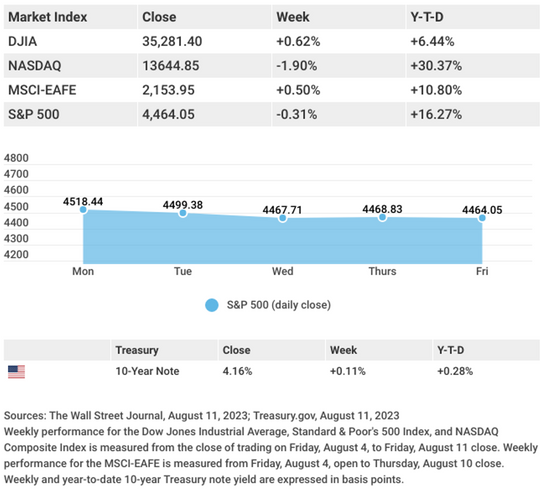Weekly Market Insights: Stocks Retreat; Powell Talk Goes Hawk
|
Stocks fluctuated last week, jostled by fitful bond yields and headline news, before ending strongly following Fed Chair Powell’s comments on the monetary outlook. The Dow Jones Industrial Average slipped 0.45%, while the Standard & Poor’s 500 gained 0.82%. The Nasdaq Composite index rose 2.26% for the week. The MSCI EAFE index, which tracks developed overseas stock markets, added 0.78%.1,2,3 |
 |
 |
Stocks Manage GainsStock rallied on Monday on upbeat sentiment over the earnings release from a mega-cap semiconductor company scheduled for mid-week, only to see that momentum fizzle the following day on weak retail earnings and a credit downgrade of a handful of banks. Stocks resumed their rally on weak economic data, which fueled hopes for future Fed dovishness. They also rose on expectations that earnings from a leading AI chipmaker would validate the AI narrative that propelled markets in the second quarter. Despite a blowout earnings report, stocks turned lower as investor attention quickly switched to Fed Chair Powell’s presentation scheduled for Friday. After some initial jitteriness, Investors responded well to Powell’s comments, posting gains to close the week. Powell Stands FirmPowell spoke on Friday at the Fed’s annual economic symposium in Jackson Hole, asserting that, despite considerable progress, inflation remained too high and additional rate hikes may be in the offing. He acknowledged that previous rate increases had not yet thoroughly worked their way through the system, so caution about further hikes was needed. Investors reacted to Powell’s comments far better than in August 2022, when a hawkish presentation sent stocks lower. Powell also addressed a growing feeling among investors that the Fed may eventually raise its inflation target to 2.5-3.0%. Powell rejected this idea unambiguously, stating that the two percent target would remain the Fed’s inflation goal. This Week: Key Economic DataTuesday: Consumer Confidence. Job Openings and Turnover Survey (JOLTS). Wednesday: Automated Data Processing (ADP) Employment Report. Gross Domestic Product (GDP). Thursday: Personal Income and Outlays. Jobless Claims. Friday: Employment Situation. Institute for Supply Management (ISM) Manufacturing Index. Source: Econoday, August 25, 2023 This Week: Companies Reporting EarningsTuesday: Hewlett Packard Enterprise Company (HPE), HP, Inc. (HPQ) Wednesday: Salesforce, Inc. (CRM), Veeva Systems, Inc. (VEEV), CrowdStrike (CRWD). Thursday: lululemon athletica, inc. (LULU), Broadcom, Inc. (AVGO), Dollar General Corporation (DG), Dell Technologies, Inc. (DELL), VMware, Inc. (VMW) Source: Zacks, August 25, 2023 |
 |
|
“Every man is working out his destiny in his own way and nobody can be of any help except by being kind, generous, and patient.” – Henry Miller |
 |
Starting a New BusinessStarting a new business? Here’s a tip that the Internal Revenue Service shares for new business owners: Choose an appropriate business structure: The form of business determines which income tax return a business taxpayer needs to file. If necessary, apply for an Employer Identification Number (EIN): An EIN is used to identify a business structure outside a personal identification number. *This information is not intended to substitute for specific individualized tax advice. We suggest you discuss your specific tax issues with a qualified tax professional. Tip adapted from IRS.gov4 |
 |
Boost Your Productivity With These TipsTake regular breaks. It seems counterintuitive, but most people are more productive when they take frequent breaks. Do the complicated tasks first. Mark Twain famously said to “eat the frog first thing in the morning,” meaning that you should tackle your most challenging task immediately. Make two to-do lists, one with your weekly goals and objectives and one with your daily tasks. Divide large projects into manageable steps. Make the things on your to-do list specific so you can continue to cross things out and make progress. Tip adapted from Formstack5 |
 |
|
At a picnic, a photo has to be taken that depicts 6 children, 4 grandchildren, 2 brothers, 2 sisters, 3 sons, 3 daughters, 2 fathers, 2 mothers, 1 grandfather, 1 grandmother, 1 daughter-in-law, 1 mother-in-law, and 1 father-in-law. What is the smallest number of people that could appear in the photo?
Last week’s riddle: Which of these five words doesn’t belong on this list: that, what, cat, sat, chat. Answer: What, as it doesn’t rhyme with the other words on the list. |
 |
 |
|
Table Mountain, Victoria and Alfred Waterfront, Cape Town, South Africa |
|
|
Footnotes and Sources
2. The Wall Street Journal, August 25, 2023 3. The Wall Street Journal, August 25, 2023 4. IRS.gov, March 1, 2023 5. Formstack, April 24, 2023 |















